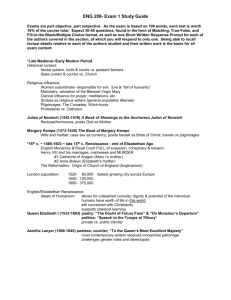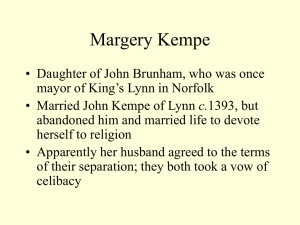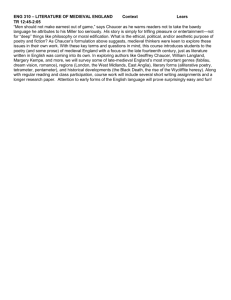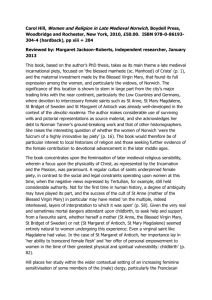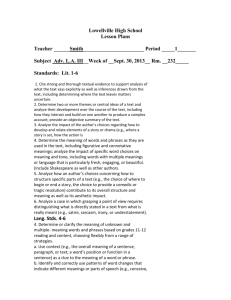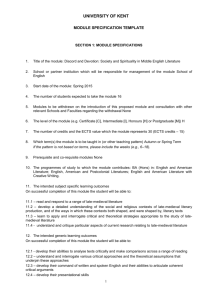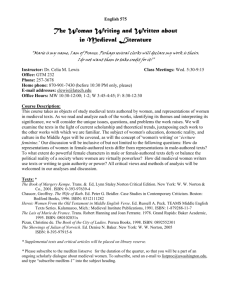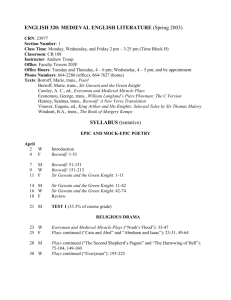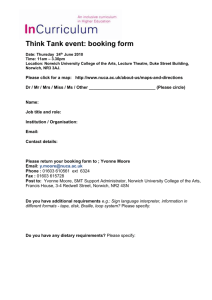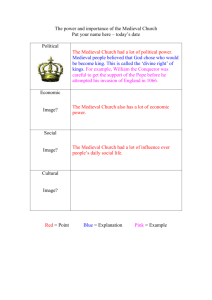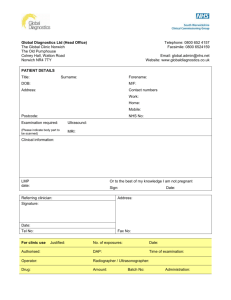Engl 469
advertisement
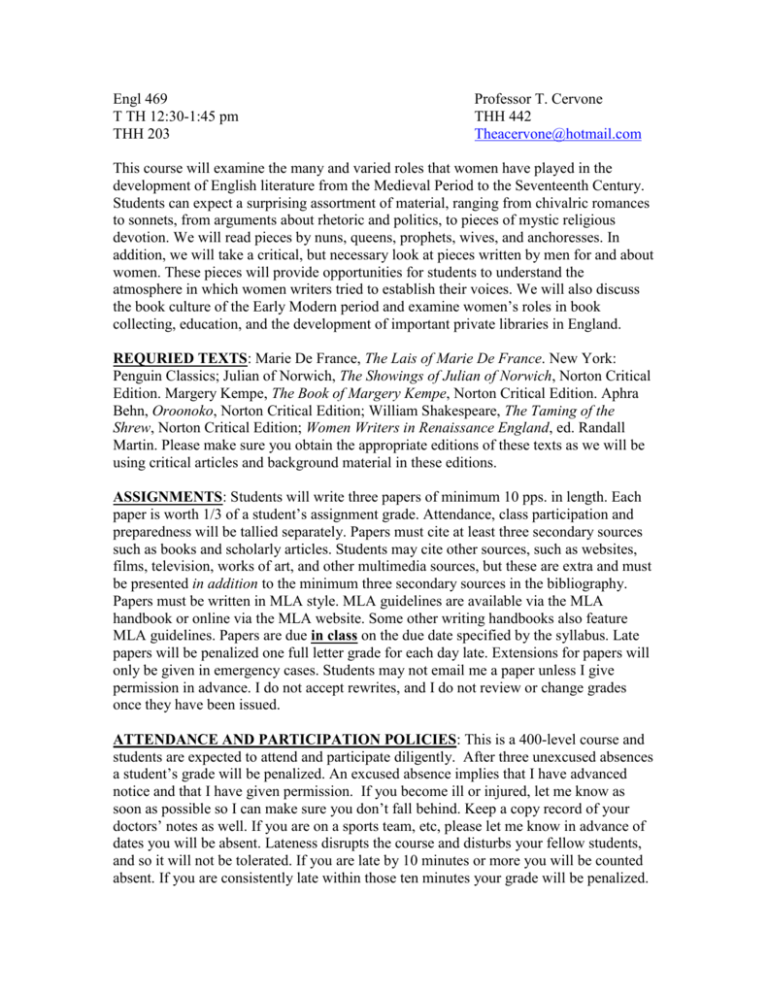
Engl 469 T TH 12:30-1:45 pm THH 203 Professor T. Cervone THH 442 Theacervone@hotmail.com This course will examine the many and varied roles that women have played in the development of English literature from the Medieval Period to the Seventeenth Century. Students can expect a surprising assortment of material, ranging from chivalric romances to sonnets, from arguments about rhetoric and politics, to pieces of mystic religious devotion. We will read pieces by nuns, queens, prophets, wives, and anchoresses. In addition, we will take a critical, but necessary look at pieces written by men for and about women. These pieces will provide opportunities for students to understand the atmosphere in which women writers tried to establish their voices. We will also discuss the book culture of the Early Modern period and examine women’s roles in book collecting, education, and the development of important private libraries in England. REQURIED TEXTS: Marie De France, The Lais of Marie De France. New York: Penguin Classics; Julian of Norwich, The Showings of Julian of Norwich, Norton Critical Edition. Margery Kempe, The Book of Margery Kempe, Norton Critical Edition. Aphra Behn, Oroonoko, Norton Critical Edition; William Shakespeare, The Taming of the Shrew, Norton Critical Edition; Women Writers in Renaissance England, ed. Randall Martin. Please make sure you obtain the appropriate editions of these texts as we will be using critical articles and background material in these editions. ASSIGNMENTS: Students will write three papers of minimum 10 pps. in length. Each paper is worth 1/3 of a student’s assignment grade. Attendance, class participation and preparedness will be tallied separately. Papers must cite at least three secondary sources such as books and scholarly articles. Students may cite other sources, such as websites, films, television, works of art, and other multimedia sources, but these are extra and must be presented in addition to the minimum three secondary sources in the bibliography. Papers must be written in MLA style. MLA guidelines are available via the MLA handbook or online via the MLA website. Some other writing handbooks also feature MLA guidelines. Papers are due in class on the due date specified by the syllabus. Late papers will be penalized one full letter grade for each day late. Extensions for papers will only be given in emergency cases. Students may not email me a paper unless I give permission in advance. I do not accept rewrites, and I do not review or change grades once they have been issued. ATTENDANCE AND PARTICIPATION POLICIES: This is a 400-level course and students are expected to attend and participate diligently. After three unexcused absences a student’s grade will be penalized. An excused absence implies that I have advanced notice and that I have given permission. If you become ill or injured, let me know as soon as possible so I can make sure you don’t fall behind. Keep a copy record of your doctors’ notes as well. If you are on a sports team, etc, please let me know in advance of dates you will be absent. Lateness disrupts the course and disturbs your fellow students, and so it will not be tolerated. If you are late by 10 minutes or more you will be counted absent. If you are consistently late within those ten minutes your grade will be penalized. NOTE: I expect a student’s undivided attention. Students must silence and put away all cell phones, blackberries and other communications devices. Due to a prolonged lack of cooperation in this area laptops and tablets will not be allowed in class. The only time students will be allowed to go on the Internet is if, in the course of class discussion, we agree to look up a source together. Any student who gets up in the middle of class and leaves for any reason that does not involve an emergency will be counted absent. If you have a pressing appointment or pending family issue, or if you need to make or receive an emergency call, just speak to me in advance and you will be allowed to leave if you need to. The same thing goes if you need to come very late because of something important. USC LEGAL POLICIES: STUDENT BEHAVIOR that persistently or grossly interferes with classroom activities is considered disruptive behavior and may be subject to disciplinary action. Such behavior inhibits other students’ ability to learn and an instructor’s ability to teach. A student responsible for disruptive behavior may be required to leave class pending discussion and resolution of the problem and may be reported to the Office of Student Judicial Affairs for disciplinary action. These strictures may extend to behaviors outside the classroom that are related to the course. STUDENTS WITH DISABILITIES who request academic accommodations based on a disability are required to register with Disability Services and Programs (DSP) each semester. A letter of verification for approved accommodations can be obtained from DSP. Please be sure the letter is delivered to me (or to a TA) as early in the semester as possible. DSP is located in STU 301 and is open 8:30 a.m.--5:00 p.m., Monday through Friday. The phone number for DSP is (213) 740-0776. ACADEMIC INTEGRITY is essential to maintain an optimal learning environment. General principles of academic honesty include the concept of respect for the intellectual property of others, the expectation that individual work will be submitted unless otherwise allowed by an instructor, and the obligations both to protect one’s own academic work from misuse by others as well as to avoid using another’s work as one’s own. All students are expected to understand and abide by these principles. SCampus, the Student Guidebook, contains the Student Conduct Code in Section 11.00, while the recommended sanctions are located in Appendix A: http://www.usc.edu/dept/publications/SCAMPUS/gov/. Students will be referred to the Office of Student Judicial Affairs and Community Standards for further review, should there be any suspicion of academic dishonesty. The review process can be found at: http://www.usc.edu/student-affairs/SJACS/. WEEK 1 8/28-8/30: The Medieval Period: Romances T: Introduction: Nuns, Queens, and Anchoresses as authors of the Medieval Period. The Sacred Feminine and medieval thought. R: Marie De France, Lais: “Guigemar,” and “Le Fresne,” WEEK 2 9/4-9/6: The Medieval Period: Romances T: Marie De France, Lais: “Lanval,” and “Bisclavret.” R: Marie De France, Lais: “Yonec,” and “Laüstic.” WEEK 3 9/11-9/13: The Medieval Period: Romances/Devotional Literature T: Marie De France, Lais: “Milun,” and “Chaitivel,” R: Marie De France, Lais: Marie De France, Lais: “Chevrefoil,” and “Eliduc.” WEEK 4 9/18-9/20: The Medieval Period: Devotional Literature T: [In Julian of Norwich Norton Critical Edition] Aelred of Rievaulx, from “De Institutione Inclusarum,”; from “Ancrene Wisse (a guide for anchoresses); Augustine, The Trinity, “The Two Parts of the Mind.” Walter Hilton, The Scale of Perfection, “The Two Parts of the Soul.” R: Julian of Norwich, The Showings of Julian of Norwich; Grace M. Jantzen, from “The Life of an Anchoress,” p. 143. WEEK 5 9/25-9/27: The Medieval Period: Devotional Literature T: Julian of Norwich, The Showings of Julian of Norwich; Caroline Walker Bynum, “Jesus as Mother,” p. 196. R: Julian of Norwich, The Showings of Julian of Norwich; Lynn Staley Johnson, “The Trope of the Scribe and the Question of Literary Authority in the Texts of Julian of Norwich,” p. 150. PAPER 1 DUE. WEEK 6 10/2-10/4: The Medieval Period: Devotional Literature T: Margery Kempe, The Book of Margery Kempe; Clarissa W. Atkinson, “Female Sanctity in the Late Middle Ages, p. 225. R: Margery Kempe, The Book of Margery Kempe; From “The Constitutions of Thomas Arundel,” p. 187; Nicholas Watson, “Arundel’s Constitutions,” p. 299. WEEK 7: 10/9-10/11 the Medieval Period: Devotional Literature T: Margery Kempe, The Book of Margery Kempe; David Aers, “The Making of Margery Kempe: Individual and Community,” p. 256; Lynn Staley, “Authorship and Authority,” p. 236. R: Margery Kempe, The Book of Margery Kempe; From The Book of Saint Bride; from The Life of Marie d’Oignies by Jacques de Vitry. Sarah Beckwith, “Margery Kempe’s Imitation.” WEEK 8 10/16-10/18: The Tudor and Early Stuart Periods: Women and Authorship T: Women Writers in Renaissance England (WWRE) Margaret Tyler, “Epistle to the Reader,” Anne Dowriche, “Epistle to the Reader,” Rachel Specht, “Epistle Dedicatory.” R: WWRE. Katherine Parr, from “The Lamentation of a Sinner.” Anne Askew, “The First Examination,” and “The Latter Examination.” Introduction by John Bale. WEEK 9 10/23-10/25: The Tudor and Early Stuart Periods: Anti-Feminine Literature and Response T: WWRE, Jane Anger, from “Jane Anger Her Protection for Women,” John Knox, from “The First Blast of the Trumpet Against the Monstrous Regiment of Women,” (USC library electronic source); WWRE, Rachel Specht, from “A Muzzle for Melastomus,” Joseph Swetnam, “The Arraignment of Lewd, Idle, Froward, and Unconstant Women.” (1617) (USC library electronic source). R: CLASS CANCELLED. 16TH CENTURY CONFERENCE WEEK 10 10/30-11/1: The Tudor and Early Stuart Periods: Anti-Feminine Literature and Response T: Shakespeare, The Taming of the Shrew; Lynda E. Boose, “Scolding Brides and Bridling Scolds: Taming the Woman’s Unruly Member,” p. 174; Anonymous, From “A Merry Jest of a Shrewd and Curst Wife Lapped in Morel’s Skin, for Her Good Behavior.” R: Shakespeare, The Taming of the Shrew; Karen Newman, “Renaissance Family Politics in The Taming of the Shrew,” p. 247. Marea Mitchell, “Performing Sexual Politics in The Taming of the Shrew.” WEEK 11 11/6-11/8: The Tudor and Early Stuart Periods: Diaries, Wills, and Legacies T: WWRE, Dorothy Leigh, from The Mother’s Blessing, Elizabeth Jocelin, “Epistle Dedicatory,” from The Mother’s Legacy to her Unborn Child; and Isabella Whitney, from Certain Familiar Epistles: The Manner of Her Will, and What She Left to London. PAPER 2 DUE. R: WWRE, Margaret, Lady Hoby, from The Diary of Margaret, Lady Hoby, and Lady Anne, Clifford, from The Diary of Lady Anne Clifford. WEEK 12 11/13-11/15: The Tudor and Early Stuart Periods: Verse T: Mary Sidney, from “The Psalms.” R: Mary Sidney, from A Dialogue Between Two Shepherds. WEEK 13 11/20-11/22: The Tudor and Early Stuart Periods: Verse T: Lady Mary Wroth, “Selected Songs and Sonnets, from Pamphilia to Amphilanthus,”; From, The Countess Of Montgomery’s Urania. R: THANKSGIVING HOLIDAY. NO CLASSES. WEEK 14 11/27-11/29: The Tudor and Early Stuart Periods: Historical Perspectives; The Later Stuart Period: The Novel T: Anne Dowriche, from The French History; Elizabeth Cary, Lady Falkland, from The History of the Life, Reign, and Death of Edward II. R: Aphra Behn, Oroonoko; “The Settling of Suriname: Lord Willoughby to Lady Willoughby,” p. 99. WEEK 15 12/4-12/6: The Later Stuart Period: The Novel T: Aphra Behn, Oroonoko; Antione Biet, “They Came Here in Order to Become Wealthy,” p. 105; Jean Baptiste Du Tertre, “A Servitude for Life,” p. 108. R: Aphra Behn, Oroonoko; John Whaley, “On a Young Lady’s Weeping at Oroonoko,” p. 152; John Locke, from “Two Treatises of Government,” pps. 161-167; “The Speech of Moses Bon Sáam,” p. 168; “The Answer of Caribeus to Moses Bon Sáam,” p. 173. PAPER 3 DUE.
